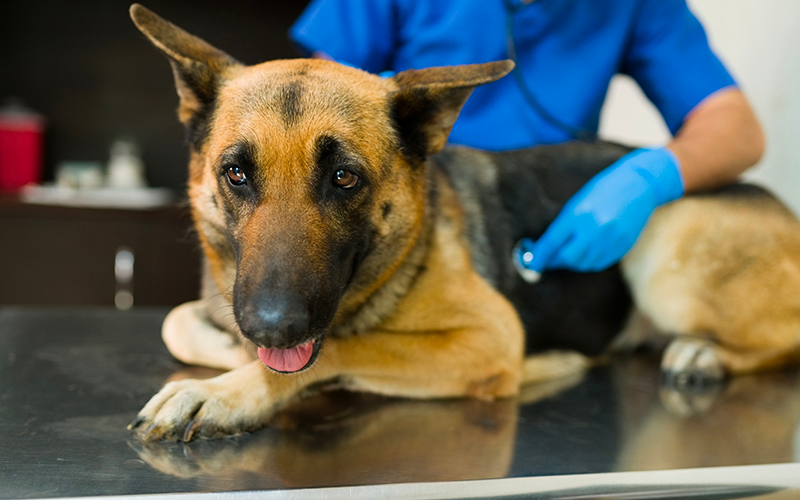Contents
Animals – pets in particular – are an important part of the lives of many individuals and families. A treasured pet is a true friend; someone who’s always happy to greet you at the door when you return from work or to snuggle with you on a cold night. When our pets become ill, we fret just as we would if a human member of our family were sick. Individuals who have mesothelioma often wonder if the disease can also affect their pets. In addition, those who own or handle animals who have encountered asbestos materials on the job – particularly police dogs and other rescue animals – may also be concerned as to whether or not these animals can develop mesothelioma.
Risk of Mesothelioma Cancer in German Shepherds

Vets note that dogs – especially working breeds like German Shepherds – can indeed develop mesothelioma cancer and are largely subject to the same risk factors as humans. Remember, however, mesothelioma is not a contagious disease so dogs cannot “catch” this cancer because they are exposed to someone who has it. Rather, mesothelioma cancer in German Shepherd Dogs or in any other pets may be developed due to direct or indirect exposure to asbestos, just like humans. As in humans, in dogs, the mesothelium is the tissue lining the chest cavity, where actually the cancer occurs. Mesothelioma cancer in German Shepherd Dogs and in any other canine breeds and pets occurs when asbestos fibers get lodged internally and initiate a tumor in the mesothelium, lungs, or pericardium. Some cases of mesothelioma in German Shepherds result from secondhand exposure to toxic asbestos. This means that someone who lives in the same home as the German Shepherd Dog probably worked with asbestos and bought hazardous fibers home with them on their clothes or body. The simple act of being affectionate with one’s animal can cause the transfer of asbestos dust to the animal, resulting in the inhalation of the fibers. Animals can also suffer direct exposure. German Shepherd Dog is known as one of the most intelligent and efficient working breeds that work with first responders at the site of disasters or fires. Such working dogs may encounter asbestos in the debris that’s left behind. As the dogs search for survivors or for the bodies of those who perished, they may inhale asbestos dust as well as a number of other toxins. In addition, if a dog or cat has occasion to roam around a demolition site where asbestos may be on the ground, the animal can bring it home on his feet or fur, further increasing the possibility of inhaling the fibers. Hence, it is necessary to be aware of your dog’s whereabouts at all times and to keep him on a leash while walking.
Why is Mesothelioma Cancer found comparatively more in German Shepherds?
German Shepherd Dog is a working breed. The popularity of the breed is due to his unswerving intelligence and working ability. He has proved to be the smartest canine breed in the world to work in the widest range of assignments – starting as a shepherd to herd sheep to seeing-eye dog to war dogs and rescue dogs, working amidst the debris. Unfortunately, the dogs most often used in police work or as rescue animals are among the breeds most susceptible to the development of mesothelioma. Research shows that German Shepherds are at the greatest risk of tumor development following exposure to asbestos. In particular, male German Shepherds face the highest risk of such tumors, and Mesothelioma cancer is the worst condition. Other breeds that are prone to the development of mesothelioma include Irish Setters and Bouvier des Flandres. Canine Mesothelioma Cancer – Symptoms You can say for sure that your dog has been afflicted with Mesothelioma cancer if you will find one or more of these signs present.
Diagnosis and other Physical symptoms
If you think that your German Shepherd is having canine mesothelioma, take him to the vet immediately for requisite examinations. Upon the thoracic auscultation, the dogs with marked pleural effusion may have muffled heart sounds. In worst situations lung sounds may decrease, accompanied by a feeble peripheral pulse. Pulmonary edema and/or an enlarged globoid heart may also be noticed. If your GSD has mesothelioma, his life expectancy will be severely shortened, as will his quality of life.
Similarities and Differences between human and canine Mesothelioma
While the disease is deadly in both humans and animals and mesothelioma treatment is difficult in both cases, there are some differences as to how mesothelioma manifests itself in animals. Unlike in humans, mesothelioma can appear fairly quickly in animals. The average age at which appears in dogs is about 8, though it has been diagnosed in younger and older animals. Usually, this is only a year or two after exposure. The symptoms of the disease are very similar for animals as for humans. Shortness of breath, fluid around the lungs, and sometimes a cough appears, usually about a month before a definitive diagnosis is made. Also, as with humans, the most prevalent form of the disease diagnosed in dogs, including German Shepherds, is the pleura; variety. Vets have also determined that dogs that have been exposed to other toxic substances in addition to asbestos have a greater risk of developing the disease. These include herbicides, germicides, and defoliants.
Treatment of Mesothelioma in GSD or in other pets
If your GSD is diagnosed with Mesothelioma, your vet may choose to pick any one or more of the very effective options for treatment, though the dog’s quality of life will be fast degrading. The vet usually suggests a thoracentesis, which is removing the fluid from around the pulmonary region. This can be performed as many times as may be required. The more preferred method for treatment of Mesothelioma in GSD or in other pets is Intracavitary Chemotherapy, in which chemo drugs are implanted directly into the affected area of the lungs. Currently, canine oncologists are recommending Intracavitary Cisplatin, which turns out to be fatal in the case of feline. However, veterinary oncologists have evidence that treating any pet, including German Shepherd Dog having mesothelioma with Mitoxantrone and Doxorubicin yields highly successful results – even complete recovery, although such situations are very rare.

 Mitochondrial Myopathy in German Shepherds: Symptoms, Causes, and Treatments
Mitochondrial Myopathy in German Shepherds: Symptoms, Causes, and Treatments